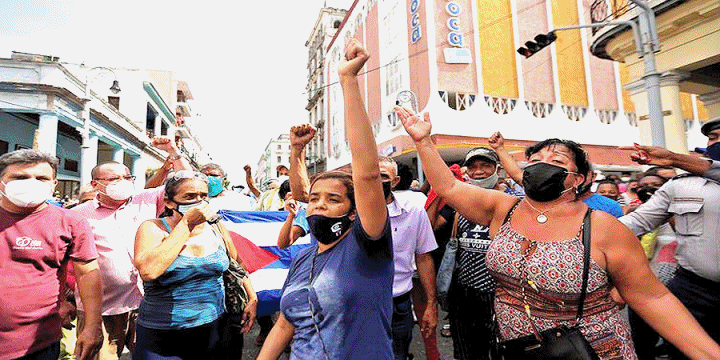CUBA UNIQUE EVENTS
AGAINST THE GOVERNMENT |
|
| Dozens of anti-government protests plagued the country on Sunday. President Miguel Diaz-Canel called on his supporters to fight back in the street. "Down with the dictatorship. " On Sunday July 11, 2021, thousands of demonstrators took to the streets of Havana and the cities of Cuba to cry out their anger at the misery and shortages. As a backdrop, the legacy of the 1959 revolution is fading away. Overturned cars, quite a symbol in the paradise of American beauties of the 1950s. Thousands of "de a pie" (those who walk on foot, in Spanish), ordinary Cubans, chanted anti-regime slogans in the streets with a rare vigor.
Widely broadcast on social networks, the parades began spontaneously in the morning, an extremely rare event in this country ruled by the Communist Party, where the only authorized gatherings are usually those of the party. About 40 anti-government protests took place across the island, which remained cut off Monday morning. The streets of Havana were still crisscrossed by the police and the army, journalists noted, but calm returned after the clashes the day before which led to dozens of arrests. In Havana, clashes broke out between demonstrators and the police who used tear gas. At least ten people were arrested and several police officers used plastic pipes to beat protesters. While he acknowledged the “dissatisfaction” that some Cubans may feel, Miguel Diaz-Canel also gave the revolutionaries “the order to fight” these gatherings in the street. Cuba is going through a serious health and economic crisis It is overwhelmed by the economic crisis that these thousands of Cubans came out with cries of "We are hungry", "Freedom" and "Down with the dictatorship". “Cuba is not yours! Cried in particular a crowd gathered in front of the offices of the Communist Party (PCC), the only political formation authorized in Cuba. The Covid-19 pandemic has indeed plunged Cuba into a serious economic crisis. Cubans have to wait long hours for food supplies every day and also face a shortage of medicines. The decline in tourism, stopped because of the pandemic, has deprived the country of a significant share of its resources. The Cuban economy fell 11% in 2020, the lowest in almost 30 years, and these economic difficulties have led authorities to cut electricity for several hours a day in much of the territory. Mobile internet, which arrived in Cuba at the end of 2018, remained cut off on Monday morning. This crisis is not linked only to the Covid-19 pandemic. According to Janette Habel, “the first problem is the sanctions” imposed on Cuba. “Above all else, this country has been the victim for 62 years of absolutely appalling economic sanctions,” observes the lecturer at the Institute for Higher Studies in Latin America (IHEAL). The protests also occurred on the day Cuba recorded a new daily record of contamination and deaths due to the coronavirus, with 6,923 cases recorded (for 238,491 cases in total) and 47 deaths in 24 hours (for 1,537 deaths in total). Faced with this situation, calls for help have multiplied on social networks under the keywords #SOSCuba or #SOSMatanzas (named after the most affected province) and a group of opponents demanded the establishment of a “Humanitarian corridor”. The initiative was dismissed by the government. Cuba accuses the United States of complicity In the aftermath of these protests, Cuban President Miguel Diaz-Canel accused the US government of carrying out "a policy of economic suffocation to provoke social unrest" on the island. After a brief reconciliation between 2014 and 2016, diplomatic relations between Cuba and the United States are at their lowest since the tenure of Donald Trump. The former Republican president has tightened the embargo in force since 1962, denouncing human rights violations and Havana's support for the government of Nicolas Maduro in Venezuela. Miguel Diaz-Canel accused the US government of being behind the protests. "There is a group of people, counterrevolutionaries, mercenaries, paid by the US government, indirectly through US government agencies, to organize these kinds of protests," he said. In a speech broadcast on television and radio, the Communist leader, surrounded by several of his ministers, assured that his government is trying to "face and overcome" the difficulties facing the American sanctions, reinforced since the mandate of the president American Donald Trump (2017-20 "What are they looking for? To provoke social unrest, to cause misunderstandings" among Cubans, but also "the famous change of regime", denounced the Cuban president. "If you want the people get better, first lift the embargo ", he added. Those behind these demonstrations" have obtained the response they deserve and they will continue to have it, as in Venezuela ", Cuba's great ally , he added. Washington and Brussels support the demonstrators As of Sunday, the American government reacted by warning the Cuban authorities against any use of violence against "peaceful demonstrators". "The United States supports freedom of speech and assembly in Cuba," tweeted US National Security Advisor Jake Sullivan. In a statement released Monday, US President Joe Biden called on "the Cuban regime to listen to its people and meet their needs." “We stand with the Cuban people and their vibrant call for freedom. " For its part, the European Union has announced its support for the “right of peoples to express themselves”. "We ask the authorities to authorize these demonstrations and to listen to the dissatisfaction of the demonstrators", declared the head of European diplomacy Josep Borrell, after a meeting of European foreign ministers in Brussels. Russia warns of "foreign interference" Great support of the Cuban authorities since Soviet times, Russia has warned against any "foreign interference" in this crisis. "We are convinced that the Cuban authorities are taking all necessary measures to restore public order in the interest of the citizens of the country," assured the Russian Foreign Ministry in a statement. Mexico offers help Mexican President Andres Manuel Lopez Obrador rejected any “interventionist” approach to the situation in Cuba and offered to send humanitarian aid. Mexico can "help by providing medicines, vaccines, whatever is needed, as well as food, because health and food are basic human rights" which do not require "interventionist political management," said the leader of the left. |
|
| Alyson Braxton for DayNewsWorld | |
 |
|




